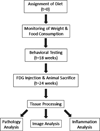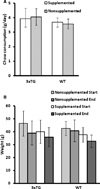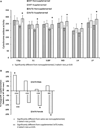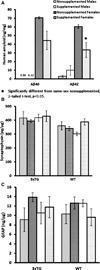Broad-based nutritional supplementation in 3xTg mice corrects mitochondrial function and indicates sex-specificity in response to Alzheimer's disease intervention
- PMID: 22796872
- PMCID: PMC3774548
- DOI: 10.3233/JAD-2012-120478
Broad-based nutritional supplementation in 3xTg mice corrects mitochondrial function and indicates sex-specificity in response to Alzheimer's disease intervention
Abstract
Nutrition has been highlighted as a potential factor in Alzheimer's disease (AD) risk and decline and has been investigated as a therapeutic target. Broad-based combination diet therapies have the potential to simultaneously effect numerous protective and corrective processes, both directly (e.g., neuroprotection) and indirectly (e.g., improved vascular health). Here we administered either normal mouse chow with a broad-based nutritional supplement or mouse chow alone to aged male and female 3xTg mice and wildtype (WT) controls. After approximately 4 months of feeding, mice were given a battery of cognitive tasks and then injected with a radiolabeled glucose analog. Brains were assessed for differences in regional glucose uptake and mitochondrial cytochrome oxidase activity, AD pathology, and inflammatory markers. Supplementation induced behavioral changes in the 3xTg, but not WT, mice, and the mode of these changes was influenced by sex. Subsequent analyses indicated that differential response to supplementation by male and female 3xTg mice highlighted brain regional strategies for the preservation of function. Several regions involved have been shown to mediate responses to steroid hormones, indicating a mechanism for sex-based vulnerability. Thus, these findings may have broad implications for the human response to future therapeutics.
Figures







References
-
- Kamphuis PJGH, Scheltens P. Can nutrients prevent or delay onset of Alzheimer’s disease? J Alzheimers Dis. 2010;20:765–775. - PubMed
-
- Joseph JA, Denisova NA, Arendash G, Gordon M, Diamond D, Shukitt-Hale B, Morgan D. Blueberry supplementation enhances signaling and prevent behavioral deficits in an Alzheimer’s disease model. Nutr Neurosci. 2003;6:153–162. - PubMed
-
- Yang F, Lim GP, Begum AN, Ubeda OJ, Simmons MR, Ambegaokar SS, Chen P, Kayed R, Glabe CG, Frautschy SA, Cole GM. Curcumin inhibits formation of amyloid-β oligomers and fibrils, binds plaques, and reduces amyloid in vivo . J Biol Chem. 2005;280:5892–5901. - PubMed
Publication types
MeSH terms
Substances
Grants and funding
LinkOut - more resources
Full Text Sources
Medical

